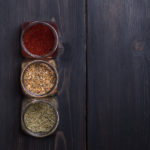By David Blyweiss, M.D., Advanced Natural Wellness
November 27, 2020
My family used to have huge picnics… truly huge.
Hundreds of my relatives would gather in Pennsylvania to enjoy an enormous spread of delicious food.
At the time, I always loved eating the meals prepared by my aunts, uncles, cousins, and grandparents. I just worked hard to avoid that potato salad sitting out in the sunshine for three hours straight (you know the one).
But there was one thing I’ve always done that got me a few looks…
When I’d sit down to eat the barbecued meat, I always carefully cut away the crispy outer skin. I was looking for the moister, softer unburned meat beneath.
Well, sure. Those crispy bits taste good. In fact, I love crispy lamb chops. But this part of the meat was not the healthiest.
Open your arteries, improve blood flow for a new health miracle...
Did you know your circulatory system has over 60,000 miles of arteries, veins and other blood vessels, if stretched end to end?
But as you age, your blood vessels undergo changes, which may cause them to stiffen, thicken and get clogged.
GOOD NEWS! Doctors have now identified a “Miracle Molecule” inside your arteries that helps OPEN your arteries and IMPROVE blood flow.
It’s what Dr. Valentin Fuster calls it, "One of the most important discoveries in the history of cardiovascular medicine."To you, that means...
- Healthy blood pressure
- Sharper mind and memory
- Skyrocketing energy and muscular strength
- Increased pleasure and passion in the bedroom
- Improved circulation to every cell and organ in your body
Go here to discover a new natural way to significantly boost the levels of this miracle molecule in YOUR body NOW!
I’ve learned over the years that there are certain good ways and bad ways to prepare your foods.
By now, you know my stance on eating a rainbow diet filled with unprocessed, organic foods. However, how you make your food is just as important.
The wrong preparation methods could take a healthy food and turn it into something extremely toxic for your body.
Here are a few of my top tips to make sure your food preparation methods aren’t exposing you to dangerous disease causing chemicals:
- Skip the Charred Meats
Char-grilled meats from the open flame are a hallmark of outdoor cooking. But this cooking method could be causing your body some serious issues. Anytime meat is cooked over an open flame, the fats can char to create cancer causing substances.[1]
So, if you’re going to be grilling foods, make sure it is very moist. I like to marinate my meats the night before in something like olive oil and herbs.
And I don’t go for the big fatty sausages or burgers. Instead, I opt for a leaner grass fed steak, chicken, or fish.
The World's Quickest Solution for Ending Prostate and Urinary Misery
This has recently been revealed to be one of the only real breakthroughs in prostate health.
The seeds of a strange fruit (sometimes called "Chinese Apples") hold powerful phytonutrients that are a revolution in prostate health.
In fact, UCLA and Veterans Administration research have now proved this to be true.
Not only that, but it may be the worlds quickest solution for ending prostate misery.
Simply stated, these phytonutrients represent a huge step beyond beta sitosterol, saw palmetto, and other phytosterols alone.
Simply click HERE if you want to have fast prostate relief...restful, uninterrupted sleep...no more constant "urges to go"...enhanced virility...and optimal prostate support for life.
If you’re cooking a duck or a chicken, get rid of the skin before you even cook it. This will reduce your exposure to cancer-causing agents called heterocyclic compounds.
While you’re thinking about your meats, remember a high amount of red meat consumption is associated with higher risks of cancers in the lung, esophagus, liver, kidney, pancreas, and prostate. [2]
In fact, one study looked at the meat eating habits of more than 1,000 men aged 40-70 years in age. White meat was not associated with any problems. But processed and red meat – especially when cooked at a high temperature – was associated with an increased risk of prostate cancer. [3]
I’ve always said, the easiest way to get pancreatic colon cancer is by eating a lot of barbeque. In fact, 70% of colon cancers could be preventable with moderate changes to diet and lifestyle. [4]
Don’t Break Your Egg Yolks
For those of you worried about your cholesterol, you would be better off avoiding scrambled eggs or omelets. Anytime the yolk is broken on an egg before it is cooked, the yolk is exposed to air and oxidizes.
So, scrambled eggs are terrible. Omelets are no good. However, boiled eggs, eggs-over-easy, or eggs cooked over-medium are all fine. When looking for your eggs, look for organic pasture raised eggs. They should have a dark yellow or orange colored yolk.
This yolk is actually very healthy for you because it has choline that your liver needs to protect you from non-alcoholic fatty liver disease. It also has omega-3 fatty acids. Just don’t break the yolk while cooking.
- High Temperature Frying is No Good for Your Carbs
Lastly, I’d like to draw your attention to those French fries sitting on the side of your plate. Anytime carbohydrate foods are fried in vegetable or animal oils, cancer-causing substances called oxysterols are created. [5]
You’d be much better off eating these foods with a different preparation method. Consider roasting your potatoes and seasoning them with fresh herbs like parsley, sage, rosemary, or thyme.
(I sound like a Simon and Garfunkel song there.)
In general, I’d like to see you eat a rainbow colored diet filled with mostly plant matter. Limit your meat intake to just a few meals a week. When you do eat meat, make sure to braise or marinate it so it stays moist and uncharred.
Then, follow up your meal with other healthy practices like mindful breathing, mediation or a nice walk through your neighborhood. This way, your preparation habits in the kitchen don’t derail your health.
Sources:
[1] Phillips DH. Polycyclic aromatic hydrocarbons in the diet. Mutat Res 1999;443:139–47.
[2] Zaynah Abid, Amanda J Cross, Rashmi Sinha, Meat, dairy, and cancer, The American Journal of Clinical Nutrition, Volume 100, Issue suppl_1, July 2014, Pages 386S–393S, https://doi.org/10.3945/ajcn.113.071597
[3] John, Esther M., et al. “Meat consumption, cooking practices, meat mutagens, and risk of prostate cancer.” Nutrition and cancer 63.4 (2011): 525-537.
[4] Giovannucci E. Modifiable risk factors for colon cancer. Gastroenterol Clin North Am. 2002;31(4):925-943. doi:10.1016/s0889-8553(02)00057-2
[5] Valenzuela, Alfonso, Julio Sanhueza, and Susana Nieto. “Cholesterol oxidation: health hazard and the role of antioxidants in prevention.” Biological research 36.3-4 (2003): 291-302.







